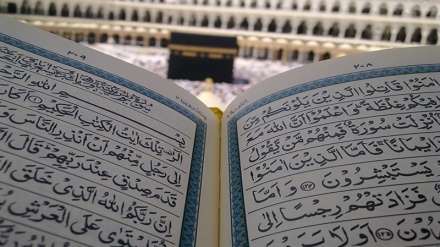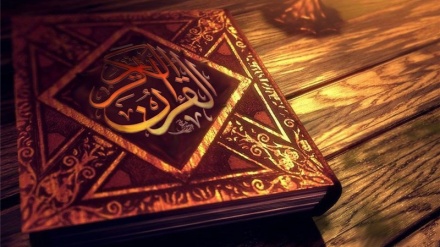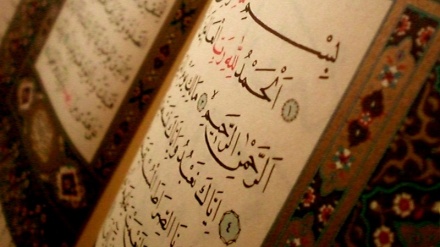Path towards Enlightenment (1010)
Welcome to our weekly episode of “Path towards Enlightenment”, which is an endeavour to make you and us familiar with an easy and fluent explanation of God’s Final Scripture to all mankind, the holy Qur’an that was revealed to the Last and Greatest of all Messengers, Prophet Muhammad (blessings of God upon him and his progeny).
As you know, last week we started explanation of “Surah Munafiqoun”, and today we complete it. Revealed in Medina it has 11 Ayahs and takes its name from its main topic, “Munafiqoun” or the “Hypocrites”. It declares that God bears witness that the hypocrites who pretend to be Muslim utter the false profession of faith only as a screen to hide their duplicity. The Surah warns the believers of the treachery of the hypocrites and describes their behaviour in some detail. Ayah 7 mentions a specific occasion on which the hypocrites tried to prevent the donating of money to the believers, and God calls on the Muslims to compensate for this by giving more of their own funds to the needy.
We start from where we left you last week and here are Ayahs 7 and 8:
“They are the ones who say, ‘Do not spend on those who are with the Prophet of Allah until they scatter off’, whereas to Allah belong the treasuries of the heavens and the earth, but the hypocrites do not understand.
“They say, ‘When we return to the city the mighty will surely expel the abased from it’; while all might belongs to Allah and His Prophet, but the hypocrites do not know.”
If you might recall, last Friday in our explanation of the previous Ayahs of this Surah, we said hypocrites are the worst enemies who live among the believers, and thus more dangerous than foreign enemies. The mission of the Prophets and saints is to rescue sinners by guiding them to the path of virtue through encouragement of seeking repentance. We also said the Prophet is the means of intercession with God for the forgiveness of those who repent of their sins and misdeeds.
The Ayahs that we recited to you now point out that the hypocrites not only avoid helping the Prophet, they also prevent others from helping the Prophet under various pretexts on the assumption that people will abandon him. They fail to understand that the treasures of the heavens and the earth belong to Allah the Almighty Creator and no one can prevent what He grants.
It was this lack of faith and shortsightedness on the part of the charlatan Mu’awiya ibn Abu Sufyan, the usurper of the caliphate, to issue a decree to deny the followers of Imam Ali (AS) any share of the public treasury. In modern times, the US and West European regimes impose economic sanctions and pressures to make the nations submit to their will.
As Ayah 8 means to say, the hypocrites intend to overthrow the Islamic state, regard themselves better than the believers, and would say that if they succeed in seizing power in Medina they will expel all the Muslims from the city.
The hypocrites fail to understand that all power belongs to the Almighty Creator, which means honour and dignity is for those who are obedient to Almighty God.
These Ayahs teach us the following points:
- True believers never desert the Prophet and the religious leaders even when deprived of material benefits.
- Those who evaluate everything according to power and wealth fail to understand sublime metaphysical realities.
- It is hypocrisy to consider others as inferior.
- In modern times, the US and the former European colonial regimes on the assumption of their overblown political and economic power impose sanctions on Iran and other countries which refuse to submit to their dictates.
Now we invite you to listen to Ayah 9 of the same Surah
“O’ you who have faith! Do not let your possessions and children distract you from the remembrance of Allah, and whoever does that it is they who are the losers.”
Since worldly possessions and children constitute one of the most significant factors behind love for the worldly life, this Ayah warns the believers against such excessive affection. It is true that worldly possessions and children are Divine Bounties and one can make use of them in Allah's Cause in order to attain real prosperity. They, however, become the worst afflictions when excessive affection for family and material possessions impedes believers from treading the Path of Truth. One becomes a hypocrite if wholly engrossed in the material life and ignores duties towards God Almighty and the people.
The same motif is most explicitly depicted in a narration from the Prophet’s 5th Infallible Heir, Imam Mohammad Baqer (AS) according to which two wolves on either sides of a cattle may not inflict so much harm than the greed and avarice of a person.
From this Ayah we learn that:
- A faithful person regards the cause of God superior to everything and is ready to sacrifice material possessions and the family in the way of God if the need arises.
- The remembrance of the Almighty Creator and fulfilling of Divine obligations are of paramount importance than excessive indulgence in pursuit of material wealth and possessiveness with family affairs to the extent that one ends up as a loser.
We conclude this week’s episode of Path towards Enlightenment with recitation of Ayahs 10 and 11, which mark the end of Surah Munafiqoun:
“Spend from what We have provided you before death comes to any of you, whereat he will say, ‘My Lord, why did You not respite me for a short time so that I might have given charity and become one of the righteous?!’
“But Allah will never respite a soul when its time has come, and Allah is well aware of what you do.”
These Ayahs refer to the roots of hypocrisy that makes a person ignore Divine commandments and refrain from spending from spending on others, while still alive, from what God has provided. Whatever a person possess is for a short time and as a trial and tribulation to determine whether are not these possessions are used and spent before death. Thus, niggardliness is meaningless.
Upon taking a glimpse at the purgatory in the last moments, many people find out that they are at the threshold of the Resurrection Day. On death and the removal of the veils of ignorance, regret takes hold for the failure to make any provisions for the Hereafter. Thus, such a person asks for return to worldly life even for a short while to compensate for the losses, but Divine Decree makes it impossible to return in view of the long respite that God had already given while alive.
So how can we avoid such a fate? The solution is simple. God says we can spend on others and for a good cause from our possessions before death.
The last Ayah of the Surah most decisively adds that God Almighty grants respite to none when the appointed time of death comes, not even for one single moment, since the Almighty Creator is aware of all things, including our thoughts and intentions.
From these Ayahs we learn that:
- The greatest loss is to ignore God and be negligent of His remembrance.
- It is hypocrisy and ingratitude to God’s favours not to spend on the needy and for a good cause, as well as to prevent others from charity.
- When the time of death comes there is no respite and no return to life upon death, so to avoid regret in afterlife, we ought to be obedient to God’s commandments by refraining from all vices and evil, including treason, sedition, and blasphemy.
AS/MG


